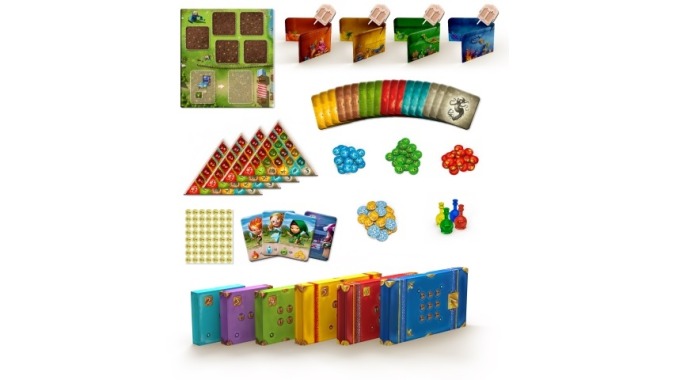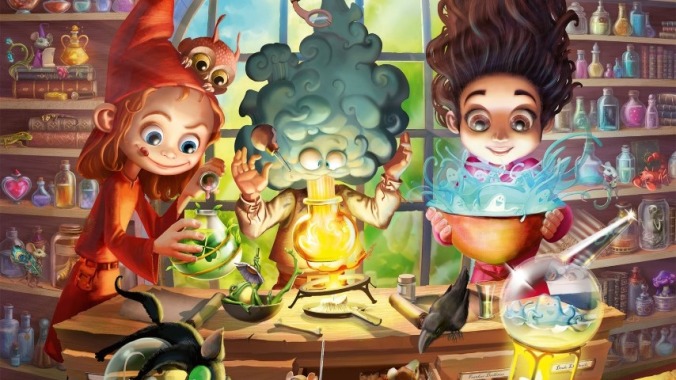Little Alchemists is the kids’ version of the heavy, two-hour game Alchemists… sort of. It starts out pretty light, but the depth of deductive reasoning the game requires increases as you play through its seven chapters, and by the end you’ve got a pretty serious midweight game that is truly excellent, but perhaps beyond the ages 7+ the box suggests.
As in the full Alchemists, players in Little Alchemists try to figure out which ingredients make which potions by using their powers of deduction. (I know Alchemists, but I have never actually played the game.) The game works through an app that will read the two ingredient tiles you place on your hidden screen and tell you what potion they make, which changes in every game. At the start of the game, there are five ingredients that can make three potions, although as you might infer, there are more ingredients and potions to come. You start the game with three random ingredient tiles and will use two in each turn, refilling your hand afterwards, but you can spend a gold coin to buy a tile from the market at any time, with no limit on how many tiles you can buy or hold in your hand. As the game goes on, there will be customers for the different potion types, offering you three or four gold coins if you happen to brew that potion while the matching customer is active. Later on, there are artifacts you can buy to gain additional in-game powers or rack up more end-game points.
When you think you’ve deduced which set of potions a specific ingredient makes, you can submit a theory to the app, selecting the ingredient and then the set of potions. If you’re correct, you gain the top gem in the stack, starting at five points and going down to three, and then you show the other players only the set of potions you identified. They each can guess the ingredient and earn one gold coin if they’re right. If your theory is incorrect, you lose one point.

The game has seven “locked” boxes that you can only open by earning keys through some cooperation—the sooner you finish a game by solving all of the ingredient/potion matches, the more keys you get, and the closer you get to unlocking the next box. Each box contains some new rule(s) and maybe components, and after box seven you have a full game, with (mild spoiler here) seven ingredients and seven possible combinations of potions, along with all of the artifact tiles. The modular components do sort of telegraph what’s coming, but even with that it’s a shrewd design that also helps scaffold younger players as they learn to handle more complexity.
My stepdaughters both loved the game, but I noticed that once we opened box six, my younger one (age seven) needed more plays to grasp the added difficulty of the new ingredients and potions. The game provides you with different “theory boards” to track which ingredients’ combinations have been solved, and they also help you visualize the information so that it’s easier to understand what theories are now impossible based on the theories you’ve collectively solved. That last bit was beyond her—and she’s really good at board games for her age. Disjunctive reasoning begins to develop when we’re toddlers, so perhaps it was the scale of the problem with so many elements that eventually got her to the point where she wasn’t as competitive as she had been through box five.
Individual games can take 20-40 minutes according to the box, but 20 minutes applies much more to the first couple of boxes than the finished game, which was easily taking us 40 minutes with three players.
The original Alchemists has a worker placement component that’s absent here, and it didn’t require the use of a companion app, which this game does. The app is fantastic if a bit glitchy—it crashed on us several times, and doesn’t always scan the images on the ingredient tiles quickly enough. It does make the game incredibly accessible to just about everyone, since it’s all based around bright, large icons that are easy to distinguish.
Because we completed the entire campaign, I’ve played Little Alchemists more than just about any game I’ve reviewed for Paste. The positive side is that my testing partners wanted to keep playing it, but I can say by the time we’d finished the whole campaign I was ready to move on to something else. The fact that it held up for about 14 to 15 plays is a real testament to the strength of the game.
Keith Law is the author of The Inside Game and Smart Baseball and a senior baseball writer for The Athletic. You can find his personal blog the dish, covering games, literature, and more, at meadowparty.com/blog.

